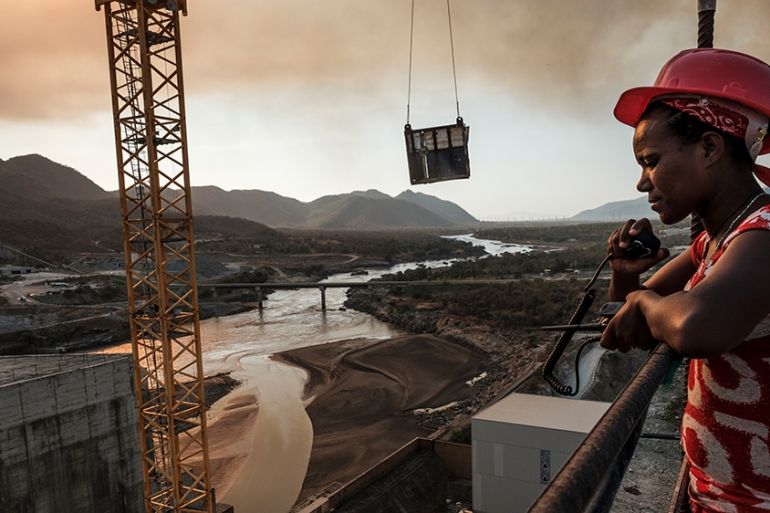Sudan minister warns Ethiopia against filling dam without deal
Irrigation minister said citizens living near Blue Nile downstream at risk as Addis Ababa plans to begin second filling of GERD.

Sudan’s Irrigation Minister Yasser Abbas has warned Addis Ababa against a planned phase second filling of a controversial dam reservoir without signing an agreement with the stakeholders, adding that the move threatens the safety of Sudanese citizens who live on the banks of the Blue Nile river.
Ethiopia has held several rounds of talks with Sudan and Egypt, which fear that the construction of the Grand Ethiopian Renaissance Dam (GERD) will lead to water shortages in their countries.
Keep reading
list of 3 itemsNile dam dispute: Sudan, Egypt, Ethiopia agree to hold more talks
Egypt summons Ethiopia diplomat over Nile dam remarks
His remarks on Monday were made during a meeting with the Head of the European Union mission to Sudan Robert van den Dool, and his deputy Daniel Weiss, Sudan’s state-run news agency SUNA reported.
The meeting comes within the framework of informing foreign ambassadors in Khartoum on the developments in negotiations between Sudan, Egypt and Ethiopia over the long-running dispute involving the filling and the operation of the $4.6bn mega-dam.
GERD has been a source of tension in the Nile River basin ever since Ethiopia broke ground on it in 2011, with downstream countries – Egypt and Sudan – worried it will restrict vital water supplies.
The prolonged dispute has continued even after the vast reservoir behind the 145-metre-tall (475-foot) dam began filling in July.
According to SUNA, Abbas provided an explanation on the progress of the talks and the proposals submitted by Sudan to push African Union experts to take on a larger role in the negotiations.
Fruitless negotiations
A new round of talks between the three neighbours began last month, but quickly broke down without crucial breakthroughs. Earlier attempts at resolving the dispute were also rendered fruitless.
After the last round of virtual meetings between foreign and water ministers, Khartoum objected to what it said was a January 8 letter from Ethiopia to the African Union stating that Ethiopia was determined to fill the reservoir for the second year in July with 13.5 million cubic metres (264 million cubic gallons) of water, whether an agreement is reached or not.
However, Egypt and Ethiopia, in separate statements, blamed Sudanese objections to the framework for the talks for the new impasse.
Ethiopia, the second-most populous country in Africa, said the hydroelectric power produced by the dam will be vital to meet the power needs of its 110 million people and help reduce poverty levels.
Egypt, which depends on the Nile for nearly all of its irrigation and drinking water, has viewed the dam as an existential threat.
Khartoum has hoped Ethiopia’s dam will regulate annual flooding, but has also warned that millions of lives would be at “great risk” if no agreement was reached.
It said the water discharged from GERD dam “poses a direct threat” to the safety of Sudan’s Roseires Dam downstream on the Blue Nile.
The Nile, the world’s longest river, is a lifeline supplying water and electricity to the 10 countries it traverses.
Its main tributaries, the White and Blue Nile, converge in the Sudanese capital, Khartoum, before flowing north through Egypt to drain into the Mediterranean Sea.